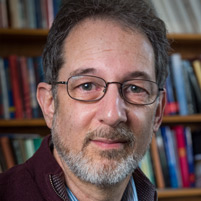New Dietrich Dean

Richard Scheines
Richard Scheines has built his career on crossing academic disciplines.
He'll bring that same approach to the Office of the Dean of Carnegie Mellon University's Dietrich College of Humanities and Social Sciences on July 1.
Scheines will succeed John Lehoczky, who has served as dean since 2000 and will return to the Department of Statistics faculty.
"At the dean's level, I hope to find opportunities to seed projects that involve faculty from humanities and social sciences as well as other parts of the university," Scheines said.
He already has helped make some connections by playing a role in the development of the university's new Simon Initiative, which aims to accelerate the use of learning science and technology to improve student learning, and to harness and leverage CMU's decades of learning data and research to improve educational outcomes for students everywhere.
"When we asked faculty to meet about creating a new center for learning sciences, a project which is still in the works, almost 40 percent of the faculty who showed up were from Dietrich," he said. "It's clear that our faculty are willing to combine their research and educational mission if they can do so in a supportive interdisciplinary context."
Scheines credits Herbert Simon for inspiring his own work in technology-enhanced learning. Scheines' research focuses on causal discovery, the philosophy of social science, and educational technology and online courses.
"I saw Simon do this, and I was one of the early people to get hooked. If you just turn your research mind toward educational problems, it's a win-win. Herb saw that educational research is interesting and hard, but very rewarding," he said.
Another area he said is ripe for development is computational social science.
"There's lots of work going on with big data sets, Google has them, Facebook has them, Twitter, etc. — the recent partnership with Yahoo. We have great opportunities to combine talent in machine learning, social and decision sciences, psychology," he said.
CMU has been home to Scheines since 1990. He said he loves the intellectual freedom the university offers.
"The reason you go into academics is that you're curious, and you like the stimulation and the activity of working with ideas," he said.
Since 2005, Scheines has led the Philosophy Department to distinction with a focus on research that connects to a wide array of other fields, including computer science, math, statistics, brain science, medical ethics and psychology.
Scheines has additional appointments in the Machine Learning Department and Human-Computer Interaction Institute. He said philosophers have had a long tradition of influencing other fields.
"Newton, Einstein, Darwin were also philosophers of science," he said. "Many fields started in philosophy, and spun off into the disciplines we house separately today. In our world, at Carnegie Mellon, the philosophers are encouraged to not only interact with but also to contribute to other disciplines. We have faculty making contributions to statistics, to mathematics, to biology, etc.
"One thing I hope to do as dean is to give the faculty a sense that it's OK to reach out beyond one's own discipline."
Scheines also will continue to help CMU's humanities departments stand far apart from their peers.
"Our humanities emphasis in Dietrich is more connected to the real world than any other program I know of," he said.
Related Links: Read press release | The Simon Initiative | Dietrich College | Department of Philosophy | Department of Statistics | Machine Learning Department | Human-Computer Interaction Institute
